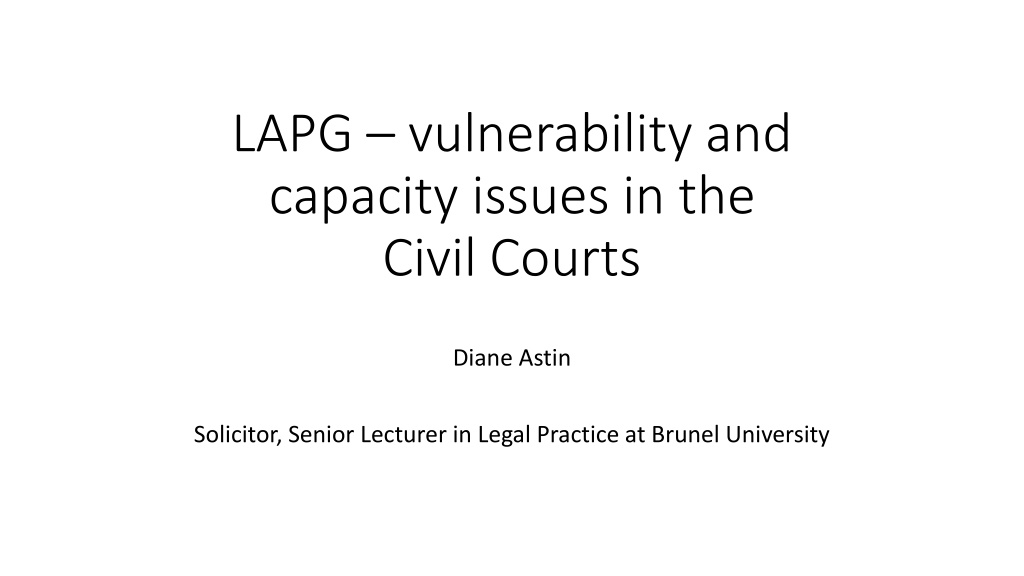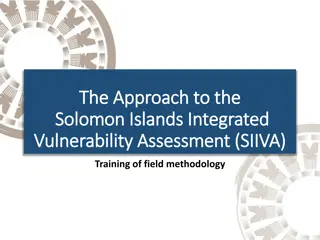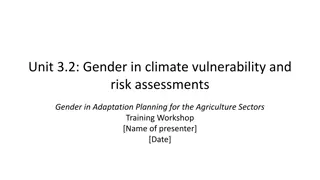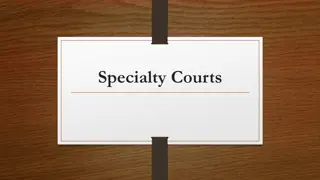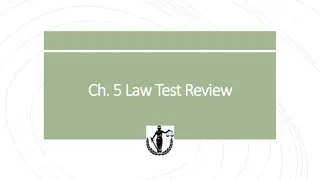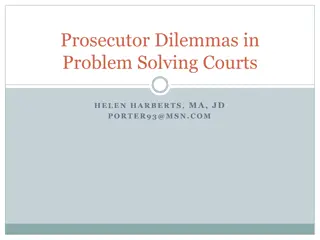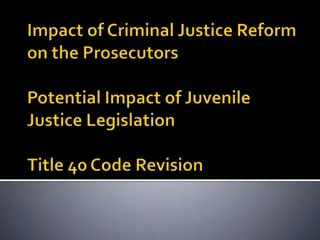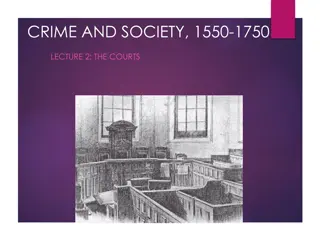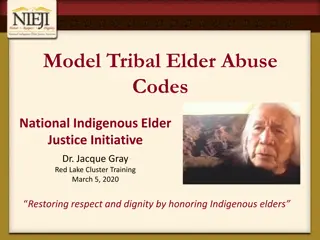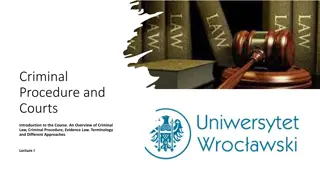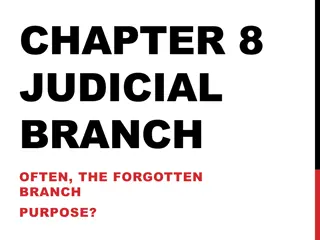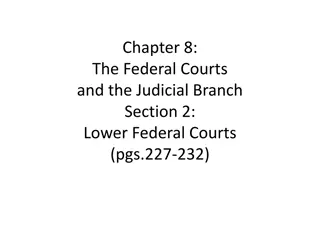Understanding Vulnerability and Capacity Issues in Civil Courts
Exploring vulnerability and capacity issues in civil courts, this content delves into the importance of addressing vulnerabilities of parties and witnesses for ensuring fair participation and quality evidence in legal proceedings. Topics covered include factors contributing to vulnerability, the role of Mental Capacity Act 2005, and ongoing efforts to improve procedures for determining mental capacity in civil proceedings.
Download Presentation

Please find below an Image/Link to download the presentation.
The content on the website is provided AS IS for your information and personal use only. It may not be sold, licensed, or shared on other websites without obtaining consent from the author. Download presentation by click this link. If you encounter any issues during the download, it is possible that the publisher has removed the file from their server.
E N D
Presentation Transcript
LAPG vulnerability and capacity issues in the Civil Courts Diane Astin Solicitor, Senior Lecturer in Legal Practice at Brunel University
Vulnerability and Capacity Vulnerability and Capacity Vulnerability Vulnerability of parties and witnesses CJC report - February 2020 CPR Practice Direction 1A PARTICIPATION OF VULNERABLE PARTIES OR WITNESSES - April 2021 Capacity Limited provision in CPR 21 protected parties someone who lack capacity [to make decisions about litigation] under Mental Capacity Act (MCA) 2005
CJC Working Group to consider the Procedure for Determining Mental Capacity in Civil Proceedings Started work in 2022 and about to publish a consultation paper Half day conference in early 2024 as part of the consultation Main issue no provision for cases when a party may lack capacity
PD 1A PARTICIPATION OF VULNERABLE PARTIES OR WITNESSES Vulnerability 1. The overriding objective requires that, in order to deal with a case justly, the court should ensure, so far as practicable, that the parties are on an equal footing and can participate fully in proceedings, and that parties and witnesses can give their best evidence. The parties are required to help the court to further the overriding objective at all stages of civil proceedings. 2. Vulnerability of a party or witness may impede participation and also diminish the quality of evidence. The court should take all proportionate measures to address these issues in every case. 3. A person should be considered as vulnerable when a factor which could be personal or situational, permanent or temporary may adversely affect their participation in proceedings or the giving of evidence.
4. 4. Factors which may cause vulnerability in a party or witness Factors which may cause vulnerability in a party or witness include (but are not limited to) include (but are not limited to) (a) Age, immaturity or lack of understanding; (b) Communication or language difficulties (including literacy); (c) Physical disability or impairment, or health condition; (d) Mental health condition or significant impairment of any aspect of their intelligence or social functioning (including learning difficulties); (e) The impact on them of the subject matter of, or facts relevant to, the case (an example being having witnessed a traumatic event relating to the case); (f) Their relationship with a party or witness (examples being sexual assault, domestic abuse or intimidation (actual or perceived)); (g) Social, domestic or cultural circumstances.
5. When considering whether a factor may adversely affect the ability of a party or witness to participate in proceedings and/or give evidence, the court should consider their ability to (a) understand the proceedings and their role in them; (b) express themselves throughout the proceedings; (c) put their evidence before the court; (d) respond to or comply with any request of the court, or do so in a timely manner; (e) instruct their representative/s (if any) before, during and after the hearing; and (f) attend any hearing.
Identifying vulnerability and making provision/setting ground rules Identifying vulnerability and making provision/setting ground rules 6. The court, with the assistance of the parties, should try to identify vulnerability of parties or witnesses at the earliest possible stage of proceedings and to consider whether a party s participation in the proceedings, or the quality of evidence given by a party or witness, is likely to be diminished by reason of vulnerability and, if so, whether it is necessary to make directions as a result. 7. If the court decides that a party s or witness s ability to participate fully and/or give best evidence is likely to be diminished by reason of vulnerability, the court may identify the nature of the vulnerability in an order and may order appropriate provisions to be made to further the overriding objective. This may include concealing the address and/or contact details of either party or a witness for appropriate reasons. 8. Subject to the nature of any vulnerability having been identified and appropriate provisions having been made, the court should consider ordering ground rules before a vulnerable person is to give evidence, to determine what directions are necessary in relation to (a) the nature and extent of that evidence; (b) the conduct of the advocates and/or the parties in respect of the evidence of that person; (c) whether one or more special measures and/or any other support should be put in place for that person; (d) any duty or power of the court under any enactment or its inherent jurisdiction to prohibit, limit or modify cross-examination of or by a vulnerable witness or to appoint a legal representative to conduct a cross-examination. 9. Before ordering any ground rules, special measures or other support, the court must consider views expressed by a party or witness about participating in the proceedings or giving evidence
PD1A PD1A - - in summary: in summary: Part of overriding objective dealing with cases justly, ensuring (as far as practicable) that parties on equal footing and can participate fully and give their best evidence. Parties must help the court to further the overriding objective at all stages of civil proceedings. Vulnerability may be personal or situational, temporary or permanent. Court should try to identify vulnerability of parties or witnesses at earliest possible stage. Court can make directions for: ground rules, special measures or other support. Before doing so must consider views of parties or witnesses.
So, what if a party lacks litigation capacity? So, what if a party lacks litigation capacity? If PD1A is being observed, should be picked up at early stage But, what then? Who decides? What evidence is needed? How is a decision on capacity made? What is really happening in the courts?
CPR 21 CPR 21 Protected Parties (and children) Protected Parties (and children) Protected parties are those who lack capacity under MCA 2005 Must have litigation friend Litigation friend can be appointed without court order certificate of suitability filed by litigation friend (other side not involved) Also, can apply to court for an order appointing a litigation friend If protected party no steps can be taken without court s permission unless a litigation friend being in place Settlement of claims by protected parties must be approved by the court So far so good, but
CPR 21 CPR 21 Children and Protected Parties Children and Protected Parties CPR predicated on it being clear that a party is a protected party no provision for cases in which it is unclear, or disputed. Working Group considered following stages: How an issue is identified How it is investigated How it is determined by the court (if in dispute or unclear) Substantive proceedings pending a determination
Issue was identified more than 20 years ago Masterman-Lister v Brutton [2002] EWCA Civ 1889, Kennedy LJ: Neither CPR 21 (nor the preceding provision, Order 80) made any provision for a judicial determination of the question whether or not capacity exists . Recommended that the Rules Committee consider the issue. Meanwhile courts should always, as a matter of practice, at the first convenient opportunity, investigate the question of capacity whenever there is any reason to suspect that it may be absent
A party with legal representatives A party with legal representatives Masterman-Lister v Brutton, Kennedy LJ at [30]: When should the issue of capacity be raised? Normally no problem arises as to when the issue of capacity should be raised. It raises itself. A responsible solicitor acting for a claimant or defendant has doubts about the capacity of his client, and seeks a medical opinion. If the opinion suggests that the client lacks the necessary capacity then the solicitor arranges for the appointment of a litigation friend.
And an unrepresented party? And an unrepresented party? Masterman-Lister , Kennedy LJ: Sometimes the doubts may arise in relation to an opponent acting in person, and then it may be appropriate to bring the issue of capacity before the court
More possible issues More possible issues Judge/court identify possible lack of capacity what are they meant to do? Solicitor thinks own client may lack capacity, client does not agree No funding for a report Specific legal aid issues client can t/won t co-operate with legal aid application chicken and egg situation
Even more possible issues Even more possible issues Duties on legal reps if they think a party may lack capacity? How to distinguish between a difficult client and an incapacitous one? Consequences if court finds own client has capacity? Costs Continuing to act Finding a suitable litigation friend OS litigation friend of last resort but overwhelmed Family and friends - see Major v Kirishana [2023] EWHC 1593
Court hearings to determine litigation capacity Court hearings to determine litigation capacity NB to distinguish between current litigation capacity and capacity for other things e.g. to enter into a contract, to agree an earlier settlement Litigation capacity : being capable of understanding, with the assistance of explanations from legal advisers and other experts, the issues on which a person s consent or decision is likely to be necessary in the court of the proceedings. Capacity is decision-specific and a person may have the capacity to conduct their own litigation but not, for example, to administer a large award of compensation.
Hearings to determine capacity Hearings to determine capacity - - some issues some issues When will a hearing be needed? Party and own lawyers don t agree Another party raises the issue Court identifies the issue Who attends the hearing? Is it in private ? What about open justice/transparency? How to protect privacy/confidentiality? Costs? What if the court agrees with a party that they have capacity? Rights of appeal/review?
Evidence/investigation Evidence/investigation If party has legal aid and co-operates not usually a problem If party unrepresented or disputes incapacity: How to gather evidence Who gathers evidence Role of the court? Equal Treatment Bench Book suggests judge may write to GP/clinician for report, and may then identify a suitable litigation friend Realistic?
Third party assistance in investigating Third party assistance in investigating Official Solicitor Harbin v Masterman inquiries. Only if funding available and lack of capacity Assessors similar to Equality Act assessors? Other models considered: QLRs Qualified legal representatives - in domestic abuse cases ALRs Approved legal representatives - in Court of Protection
CJC Capacity consultation CJC Capacity consultation Please look out for the consultation coming soon - and respond Please come to the conference in early 2024
